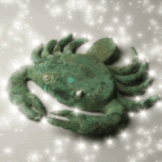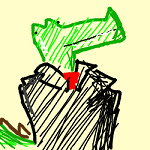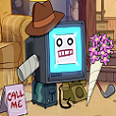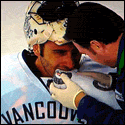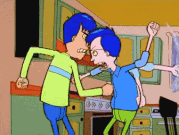|
Reading Infinite Jest on the kindle was so much better than a physical book, because it was super easy to go back and forth between footnotes. They were all little links.
|
|
|
|

|
| # ? May 11, 2024 09:01 |
|
Martello posted:What do you mean by the "replicative nature?" I mean, I get that ebooks are supposed to replicate regular books, but they definitely aren't the same thing. Just the simple fact that you can highlight a word and look it up in the onboard dictionary, or on Wikipedia, changes the reading experience tremendously. With a physical book you'd have to type that word into a computer, look it up in another physical book, or use your phone or whatever. With an e-book you just highlight the word and off you go. Their point was that at their heart ebooks are just meant to give the physical experience digitally, as opposed to offering anything new due to format (though your points are valid, they arguably don't change the book itself). I just thought it was an interesting lecture. I wish I could remember more of it. I guess it's like Snickers and Snickers Fun Size. Sure, Fun Size has benefits, but they're just meant to be like Snickers anyway so original Snickers won't go away unless Fun Size begins to offer something unique about Snickers that Snickers simply cannot do.
|
|
|
|
So...MP3s are exactly the same as vinyl records? I mean, they just replicate the musical recording in a digital format, is all.
|
|
|
|
I really like to hold the LP in my hands. A digital song just doesn't have the soul of a cassette. And that new fangled iPod - who wants to carry around all those songs? It's preposterous.
|
|
|
|
magnificent7 posted:I really like to hold the LP in my hands. A digital song just doesn't have the soul of a cassette. And that new fangled iPod - who wants to carry around all those songs? It's preposterous. If you replace cassette with vinyl, I unironically agree with you. I mean, it's nice having an iPod for a run or a long bus ride, but it doesn't hold a candle to sitting in a comfy chair, having a drink, and listening to an old Django Reinhardt record, pops and clicks and all. Old things have a personality. Same goes for books. I love my kindle, and I use it all the time, but when I'm home in my chair and relaxing, I'd rather have a book in my hands.
|
|
|
|
PoshAlligator posted:Their point was that at their heart ebooks are just meant to give the physical experience digitally, as opposed to offering anything new due to format (though your points are valid, they arguably don't change the book itself). Untrue. It has allowed the market to welcome previously-unthought of quantities of lovely zombie novels and reams of billionaire erotica. (I hate zombies and billionaires in roughly equal measure.)
|
|
|
|
It`s also impossible for me to have a physical copy of "Mills College Anime Club." +1 for ebooks.
|
|
|
|
Purple Prince posted:There's an interesting question here: How do you think the medium a book is presented in (i.e. eBook or physical book) affects the reading experience? The important thing is the words. If you need special packaging and little rituals to enjoy reading those words, don't pretend that makes you a better reader than other people, because most people have no problem sinking deep into a text without being precious about it. It's the same with writing. Some authors have rituals (which only end up getting in the way if disrupted), and others have no problem writing no matter where they are. Hey, guess what, having a tablet with keyboard means I can sit down and write anywhere, same with reading. Yes, you can do that with a notepad, but my tablet is a billion times more convenient, especially if I want to transfer those words to a computer once I get home. Also, I type faster than I can write longhand. If you prefer longhand go for it, but don't try to tell people the words they write don't have a "soul" if they don't like writing the old-fashioned way. That's just loving ridiculous, and the same goes for reading. The packaging does not have any affect whatsoever on the words inside unless the author has made conscious decisions in that packaging, and most don't even get a say. In most cases, the cover is a marketing tool created by marketers, so don't give me that bullshit about only physical books having a "soul." Tell you what, why don't you put together a book by hand. Make the paper yourself and bind it. Turn your words into a collage. Then I'll grant you that ONE OF A KIND book has a "soul" and needs to be experienced in person.
|
|
|
|
Stuporstar posted:I type faster than I can write longhand. If you prefer longhand go for it, but don't try to tell people the words they write don't have a "soul" if they don't like writing the old-fashioned way. That's just loving ridiculous, and the same goes for reading.
|
|
|
|
I'm still smacking my head over that whole, "I can highlight a word and look it up IN THE BOOK RIGHT loving THEN AND THERE". Honestly, that's a game changer that should be the end of the conversation.
|
|
|
|
Yeah looking up words is awesome, and also being able to save passages that I find particularly interesting. I think in general, all of the arts are undergoing a sort of renaissance, insofar as the tools to create and distribute original material are more accessible than ever. Some people say this is a bad thing, and that mediocre E-book self-pub authors are a dime a dozen, as are prolific Deviant Art furries and lovely Soundcloud "musicians". But if it makes exposure more accessible to lazy disaffected oblivious schmucks like me, more power to it, whatever it is. I mean lets say I finish my totally original talking pig fiction masterpiece and no one wants it, at least I can throw it up on Kindle or w/e and hope someone out there has the kindness and compassion to read my poo poo and maybe feel a thing about it.
|
|
|
|
I'm weirdly fascinated the 1,187 highlighters-------------- notations. I think it's only on the e-ink kindles, though.
|
|
|
|
magnificent7 posted:I'm still smacking my head over that whole, "I can highlight a word and look it up IN THE BOOK RIGHT loving THEN AND THERE". Honestly, that's a game changer that should be the end of the conversation. The last physical book I bought was a copy of David Byrne's How Music Works. A couple weeks after I bought it, I read a review that mentioned the ebook version had links to music examples and supplementary reading. In this particular case, it would have enhanced the reading experience. I would have liked to know what a violin sounds like without vibrato. I would have liked to have a sample of Thomas Edison's early recordings. I would have like to hear some African polyrythms. I had to look all this stuff up on my tablet later. Though the hardback version is a nice product, I felt a bit ripped off because you can't do that with a paper copy. Edit: when it comes to non-fiction, I would have also liked to not have to lug around four or more ten-pound textbooks every day in University. Stuporstar fucked around with this message at 04:47 on Aug 8, 2013 |
|
|
|
Here's a question which I have been wrestling with for a while, but it's so basic and stupid that I do not want to ask it of the NYT best-selling author I know because I fear he will think I'm Moon Moon. Chapters. What the gently caress are they and how do I know when to break things up into them? I have conflicting thoughts on the purpose and use of "the chapter", and maybe I'm just overthinking it! But seriously, I'm outlining and feeling like I should start marking certain stuff off as its own chapters, just to make further work easier, and my brain is making GBS threads itself over chapter breaks.
|
|
|
|
Blade_of_tyshalle posted:Here's a question which I have been wrestling with for a while, but it's so basic and stupid that I do not want to ask it of the NYT best-selling author I know because I fear he will think I'm Moon Moon. This is not as stupid a question as you may think. The truth is, most people generally go by what feels right, so there's no simple answer. What I can give you is a bit about how chapters evolved. Leaving aside epic poetry (because I'm not too well read on it), the chapter can be thought of as relating to the act structure in plays. You have an act, which starts and stops at major pivotal points in the narrative. Each act is broken into scenes. Coming out of serial literature, like Dickens and Dumas, you have these acts broken into chapters, usually a slightly larger unit than the scene. Each chapter, as you read them now, was originally one instalment in the series. Because each instalment had to keep the reader both satisfied for the day, yet eager to read the next instalment, it had a natural arc as well as a lead, or cliffhanger. Each chapter has minor pivotal points in the narrative, which can take place over one scene or many. You have to go by feel. Think of it like reading a child a bedtime story over the course of many nights. At some point you have to stop and say, "Go to bed," but you have to answer enough of the child's questions to leave them satisfied or they will keep bugging you and refuse to go to sleep. This is the natural end of a chapter. Once you find it, you can push past it just a bit to create enough unresolved conflict to keep the child riveted. When writing popular fiction, you don't want the child to get comfy and go to sleep. You want to keep them up all night reading. If you're still on your first draft, you're over-thinking it. If you're too hung up on it, divide your story into scenes instead. Save making decisions on chapter breaks for the revision.
|
|
|
|
If chapters are acts in a play, then the copy of Dan Brown's Inferno I have sitting next to me has 104 acts. I think you guys are right in that there's no real answer to the question. It's very much the author's preference. Breaking them up into acts is one way, but maybe you have a few long scenes so you break your story up by scene. Maybe you're body hopping between the perspectives of several (or maybe only a couple) different characters, so each switch could be a new chapter. Think about how you're story is structured and figure out your own design, or just go with what feels right.
|
|
|
|
ViggyNash posted:If chapters are acts in a play, then the copy of Dan Brown's Inferno I have sitting next to me has 104 acts. Acts are not chapters. Acts are broken (further) into chapters. Didn't think I needed an adverb there to make that clear. You want at most five acts, but you can break that into as many chapters as you like, or even none at all. All a chapter does is break the narrative into more digestible chunks, whereas the act is an essential unit it in classic plot structure. Stuporstar fucked around with this message at 21:31 on Aug 8, 2013 |
|
|
PoshAlligator posted:I'd say 50k is a little on the short end unless it's YA (for print). If anyone is interested an agent told me (so this is just what they'd look for) 90k-100k for general, commercial fiction. 60k-80k for literary fiction. Historical romance 90k-110k. Contemporary romance 80k-105k (though romance is pretty varied, series romance is shorter). Cozy mysteries 60k-80k. Bigger mysteries 85k-105k. Big thrillers 90k-105k. Scifi/Fantasy 90k-150k. YA 50k70k. Non fiction is all over but generally 60k-90k. Quoting from a previous page. Thanks for this, it's interesting. I agree with your final paragraph. I haven't self-pubbed yet, but I'm looking into writing shorter works, putting them up, and expanding on the genres and styles that sell well. Having a greatly reduced turnaround time between writing and getting sales patterns means you'll be able to become a far more efficient and effective author (money-wise) than anybody in the old days. You don't have the guidance and experience of the publishing industry, but you also won't suffer so much from exploitation. And there is now room for people to write what they want to write, at the levels they want to write, rather than having to hit the bar that the publishing houses set in order to take your work on board. Not everybody has to be (or wants to be) Stephen King to consider themselves successful and happy with their work. It's now possible, thanks to eBooks and the reduced overhead involved in selling your work, to make a living without also earning enough to ship physical books halfway around the world and support the small team of people who handle financing, distribution, marketing etc. A lot of people who otherwise wouldn't be authors are, although the downside is that so too are a lot of people who possibly shouldn't be. Sulla Faex fucked around with this message at 21:25 on Aug 8, 2013 |
|
|
|
|
Stuporstar posted:Acts are not chapters. Acts are broken (further) into chapters. Didn't think I needed an adverb there to make that clear. You want at most five acts, but you can break that into as many chapters as you like, or even none at all. All a chapter does is break the narrative into more digestible chunks, whereas the act is an essential unit it in classic plot structure. Earlier, I posted the first three paragraphs of a short thing I was writing, and according to feedback it was terrible. Too wordy, scene wasn't clear, too much "telling" and not enough left to the imagination. Mostly amateur technical mistakes. I tried to take that criticism and what I've read of Writing Tools into account as I rewrote it from scratch, but I doubt it's perfect: quote:The alley was a dead end slit between two dilapidated warehouses. A towering fence halfway down left no way through to the empty lot beyond. The combined luminance of the dim moonlight, the deserted street light at the entrance, and the powerful array of spotlights littering the busy harbor far beyond the lot at the exit could not do more than silhouette the three figures gathered within the darkness. Based on last time's feedback, I know someone's going to question the wonky perspective changes. There's two reasons for it: 1) It supposed to be a lot like Dan Brown's body-hopping third person style where he will switch perspective between various characters for different cinematic perspectives certain scenes, even though he has a clearly defined protagonist. 2) There is another character that shows up towards the end who is revealed as the narrator. I'll make a thread for the finished product for a narrative review when its ready, but until then is it ok if I post segments for a technical review every now and then so I can get feedback to help me improve? Is that something that would be frowned upon since this is just an advice thread?
|
|
|
|
ViggyNash posted:Just a jest, I didn't mean that literally. Poe's law. You never can tell. The Fiction Farm thread is where you want to post segments of your stuff for critique, not here.
|
|
|
|
Can you give me a link? I don't see it in Creative Convention anywhere.
|
|
|
|
ViggyNash posted:It supposed to be a lot like Dan Brown's body-hopping third person style
|
|
|
|
One thing I think is important that most writers take for granted is that your chapters should all be roughly the same length. I never noticed it before, but when I read a (bad) book recently, I was surprised by how much it annoyed me that one chapter would be 10 pages, another 50, and the rest somewhere in between. Readers usually put books down at chapter breaks, so it helps the reader's patience to keep it consistent. It's definitely not something to worry about on early drafts though.
|
|
|
|
I'm really in love with novels that have Parts lately. It really helps me break up the acts in my head and makes sure I'm on the right page. I may try to utilise them myself.
|
|
|
|
Qwo posted:One thing I think is important that most writers take for granted is that your chapters should all be roughly the same length. I never noticed it before, but when I read a (bad) book recently, I was surprised by how much it annoyed me that one chapter would be 10 pages, another 50, and the rest somewhere in between. Readers usually put books down at chapter breaks, so it helps the reader's patience to keep it consistent. Chapter 4: Eleven pages Chapter 5: Three pages Chapter 6: Fourteen pages So no, all of your chapters do not have to be roughly the same length. That is not a rule.
|
|
|
|
I like books with different chapter lengths. I think it's fun to have a very short chapter. To me it's like "this is very important, but not that long, so it gets its own chapter instead of being tacked onto the end of something else."
|
|
|
|
ViggyNash posted:Can you give me a link? I don't see it in Creative Convention anywhere. http://forums.somethingawful.com/showthread.php?threadid=3527097&userid=0&perpage=40&pagenumber=1
|
|
|
|
Thanks for the link, and thanks for your guys help before.
|
|
|
|
crabrock posted:I like books with different chapter lengths. I think it's fun to have a very short chapter. To me it's like "this is very important, but not that long, so it gets its own chapter instead of being tacked onto the end of something else." Seriously, there's no hard set rule to chapters beyond "each one kind of should have its own weight." Like, you can really effectively have a one sentence chapter, and have it be really insanely well written, so long as it has fairly similar narrative weight to all the other chapters. Kind of a cheating example, but the firefight near the end of Marathon Man is a loving intensely beautiful example of a one sentence chapter.
|
|
|
|
ViggyNash posted:The alley was a dead end slit between two dilapidated warehouses. A towering fence halfway down left no way through to the empty lot beyond. The combined luminance of the dim moonlight, the deserted street light at the entrance, and the powerful array of spotlights littering the busy harbor far beyond the lot at the exit could not do more than silhouette the three figures gathered within the darkness. This is an improvement from before but it's still too wordy and NOTHING HAPPENS. I'm very tempted to do a line-by-line but I won't. Instead I will tell you what this feels like to me when I read it: I see the setting materialize in my mind. I have a pretty strong idea of what it physically looks like, but there is no "tone," I just know the layout of the buildings, alley, and all of the light sources. All these descriptive words and there is nothing to catch me off guard or change the tone from "default". Moonlight is always dim, warehouses are always dilapidated, harbors are always busy, arrays of spotlights are always powerful, streets at night are often deserted. If you're going to spend a full paragraph doing nothing but describing the scene, at least set the tone as well. Have a bunch of stuff happen, and put descriptions in between. At least have a "rotting warehouse," at least give the moon a "sickly glare". Over-describe one thing really quick and let the reader's imagination work out the rest: show someone stepping into a puddle that has rusted the chain-link fence. After I see the scene materialize, I see three statues forming silhouettes in the alley. Then I see Jason leaning, motionless, while Maya breaths hard, but doesn't move. I then am told several things about these shadow statues. I am told how these statues would feel if they were ever to do something. I am told about some kind of conflict that is not going to affect this scene. Now the Maya statue is farther away, frozen again but still breathing. She is frozen now in a "hold up her gun" pose. I am told more about the statues. Suddenly a younger girl statue is leaning on the fence, also not doing anything. The girl statue doesn't know what is going on (neither do I), and now I see the Maya statue pointing the gun at the young girl. I don't actually imagine Maya moving, I just retroactively amend my mental image of her stance to have always been pointing the gun this way. All of these descriptive lines slow down the action. You have no action at all, just descriptions of physical positions and telling. "Show, don't tell" is thrown around everywhere, but there's good reason for that. It's possible to go overboard and not tell anything, but you shouldn't worry about that now: Show as much as you can. You are already showing us what everything looks like, but now you need to show us what is happening. I imagined this scene to take place over the course of about five seconds. If you're going to spend several paragraphs on five seconds, those better be five seconds packed with conflict. There was conflict in this scene, but we were just told about it. We barely were even told about it though; we were told about each isolated character's attributes and how they were standing still. All we know about the conflict is that they both have guns and that Maya is pointing a gun at a kid. As a reader, why should we care about this scene? You should practice writing something with almost no description. If you write really good STUFF HAPPENING short fiction, people will still probably like it. You might hear, "I could use a bit more description/setting the scene, but I liked this." If you do nothing but describe the scene, there will be nothing to like. angel opportunity fucked around with this message at 14:38 on Aug 9, 2013 |
|
|
|
systran posted:Some eerily relevant things. This crit made me shudder, as I think I'm the worst offender in TD. Systran, if I sent you a 4,000w story I'm trying to make good and you were feeling generous, would you angrily cross out everything that struck you as irrelevant? Please?
|
|
|
|
Symptomless Coma posted:This crit made me shudder, as I think I'm the worst offender in TD. My favorite line from "Self-Editing For Writers" is KILL YOUR CHILDREN. I'm sure it's not from there, but it means you need to get comfortable deleting stuff from the story no matter how much you love it. If it doesn't push the story, kill it. I mistakenly got a Dean Koontz book on Audible. If you remove all the excessive descriptions, his book would be a pamphlet.
|
|
|
|
The thing about kill your children is, after you kill them, you forget about them and don't feel bad. hello nsa.
|
|
|
|
I guess what I'm saying is: anyone up for killing my children and posting a video of it? Eww.
|
|
|
|
Symptomless Coma posted:I guess what I'm saying is: anyone up for killing my children and posting a video of it?
|
|
|
|
magnificent7 posted:My favorite line from "Self-Editing For Writers" is KILL YOUR CHILDREN. I'm sure it's not from there, but it means you need to get comfortable deleting stuff from the story no matter how much you love it. If it doesn't push the story, kill it. I don't know about KILL YOUR CHILDREN, but there's a quote of a British author in Writing Tools which says bluntly, "Murder your darlings."
|
|
|
|
ViggyNash posted:I don't know about KILL YOUR CHILDREN, but there's a quote of a British author in Writing Tools which says bluntly, "Murder your darlings." Butcher those you love.
|
|
|
|
You know, I'm trying to write an outline over here, and I've got Karla Homolka and the Menendez brothers posting in the drat thread about how to set up quiet spaces for writing. 
|
|
|
|
Nobody here will probably remember me, but I figured I'd swing by anyway and give a shout out about the virtues of perseverance, when it comes to actually writing substantial amounts of fiction. I did use to post here somewhat frequently, a couple of years ago (I was a big fan of the old "fiction writing" thread) but I sort of quit frequenting the forum, when I realized that the undue amounts of energy I would occasionally spend procrastinatingly posting about writing, could be probably put to better use actually, you know, writing. So I've been on a - what - 3 year hiatus from CC? Probably, something like that. Well, the long and short of it is I did manage to write my novel - literary fiction - and I did manage to get it picked up by a publisher and published in book chains and stores across the country. I'm not from the US by the way, and English is my second language, so bear with me. I'm working on my second novel at the moment - I'm about 135 pages in and the publisher (deciding from the first 100 pages and my general synopsis) has given me the go-ahead and a pre-approval for it(meaning they'll take it once it's done, unless I somehow end up screwing the whole venture to a truly hilarious degree), which is a nice feeling; there's a bit more leeway this second time around, is the feeling I get, now that my foot is in the proverbial door. All this just to say that while I'm not a veteran by ANY means or measure, I still have a bit of knowledge and some thoughts that I figured somebody here might appreciate. I guess this counts as an ugly - indeed for fiction writers the worst - kind of advice: unsolicited. But I know I myself would've benefited from reading it when I was 10 years younger. So here goes: I would just like to, briefly, stress the idiotically simple fact that one of the utterly vital things to becoming an actual, published novelist is sitting down and finishing your novel in full, regardless of how much you hate yourself, your work, your life and everything you've ever put to paper. It's not important whether or not your 1200 word "excerpt" or your "groundworks" or your "intros" get high marks or positive responses by your friends or whatever, nor is your "idea" important or your "framework" or "research." I understand why it's tempting to come up with a super-cool idea and, rather than sit down and spend 3 years of your life typing it out only to have your super-cool idea turn into a mediocre manuscript which is rejected everywhere, you'd just go out and get a bunch of positive feedback on the super-cool idea itself. It's not a good idea. It's an easy thing to do, but it's a very bad idea. A bit of formal logic for you: How do you know if you are a novelist? Answer the following: Did you or did you not sit down and write an entire novel, with everything that entails? Did you type out a manuscript, edit it, revise it, re-edit it and work it through? If so: congratulations, you're a novelist. If not: you're not a novelist. You need to understand and internalise the following happy statement: you get to be a novelist if you want to be. just put in the work and write a whole novel. You also need, however, to understand the sobering addendum to the statement: being a novelist does not necessarily entail having your work published, or being read, or being praised or being any good. Those are all contingents. They may or may not occur as a direct result of your becoming a novelist. What is necessary is writing the actual book. Everything else is a second-thought. If your priorities are on being published, being famous, being read, rich or even able to make a living off of it, you're off to a bad start. Every time you're spending time polishing an "excerpt" from a work you haven't written yet, every time you're posting online in the CC "flash fiction" thread (horrible thread!), you are, essentially, killing off your own manuscript and your own work. It doesn't matter what you've written so far. It doesn't even matter if it's any "good" (within reason, of course) - what matters is: are you going to keep working on it and are you going to finish it? Faulkner didn't stop every 3000 words, edit his work a couple of times and mail it off to his friends in the hopes of being told that he was super-duper talented and "could probably do" something great. People our age - I'm in the death throes of my twenties myself and I've been battling these tendencies my entire adult life - are so horribly accustomed to this whole toxic facebook/forum/internet phenomenon of complete and utter levels of instant-gratification - where you're basically so sure to get a bunch of non-persons on the internet applauding you for whatever IOTA of artistic expression you put forth -- that from any sort of gratification/hedonist point of view, you'd be an idiot not to stick to publishing "flash fiction" on SA and facebook, since the comparative amount of positive feedback you're likely to accumulate from producing ten little polished 600 word pieces about a farmer killing a sheep with his bare hands and posting it to a bunch of like-minded idiots with similar aspirations and lack of follow-through, is vastly greater than the amount of positive feedback you're likely to ever get if you remain just at your desk, toiling away in obscurity on one, single, large, manuscript which, statistically, nobody is ever going to want to publish. From the point of view of the gratificationist or the social media dopamine fiend, figures, there is absolutely no doubt as to which of the two ventures yields the best cost/benefit analysis. You would, in fact, be a fool to ever try and write a novel. We all like feeling good, being perceived as intelligent or talented and receiving praise. I'd venture to say that the more talented you are, the more toxic these kinds of places (forums, facebook, local writing groups) are going to be to you and to your process. Displays of talent will get you a lot of praise for a relatively low amount of effort; writing a novel will get you, on average, zero amount of praise for a stupidly large effort. This is exceptionally good news for the kind of person who genuinely needs to be a novelist though (talented or not) since it means that a lot of your "potential" competition won't ever finish a manuscript. In the world of fiction writing, this is about as solid a piece of advice as you're going to get on how to get ahead: teach yourself not to quit. If you, as a would-be novelist, have a whole finished novel to send off, you're already better off than the thousands upon thousands of would-be novelists who are super-duper adept at writing pretty and intelligent and heartfelt and thrilling fiction and spend their time being told so by other super-duper talented non-writing writers in their online echo-chambers. Writing pretty prose is a fairly doable thing, in small quantities. The real brutality of the trade lies in sitting down and writing a book, front to back (and editing it several times over)all the while being painfully aware that not all of your prose is pretty at all and that some of it, in fact, is down-right horrid and knowing that you are going to have to work like an idiot for months to come in order to ever finish and, even then, odds are nobody is going to want to read it and you sure as hell aren't going to be getting any praise for finishing it, anyway. A "novelist" is just a person who wrote an entire novel, even though writing an entire novel is a really unsatisfying way to be spending your time.. Sure, it's cool if you get published, but odds are you probably won't. Nobody but you has any interest in what your novel's about or whether or not you're ever going to finish it. There isn't a sack of gold at the finish line. It's dumb work and for that reason, most people - being sound of mind - simply don't do it. This is good news for the person who feels like they need to be a novelist though, since it means that a large amount of what is required to get published is just enormous amounts of sheer, good-old fashioned pigheadedness. If you do manage to finish and entire manuscript, edit it, edit it again, throw half of it away and then finish it again, and then edit it again, you're basically way ahead of most other people who claim they "want to write a novel." "Writing well" will only take you so far. Every moron with a sense of the language can write well, given enough time. A person who "writes well" is not a novelist. Nor is an intelligent person, a talented person or a prodigious person a novelist. A person who wrote a novel, is a novelist. I know this sounds kind of dumb but for me (and I may be kind of a dumb person) this realization took years to come by: You get to be a novelist, if you want to. This doesn't mean that your novel won't be bad and it doesn't mean that anybody is going to want to read what you wrote and it sure as hell doesn't mean that you will be published. It does NOT mean you will get to buff your nails on your suave turtle-neck at a dinner party and refer to yourself as a "novelist" without feeling like a loving TOOL. These things might happen, as a direct RESULT OF YOUR BEING A NOVELIST, but they are all contingents on the success of your venture to be a novelist. None of them are NECESSARY for it and your being a novelist does not necessarily bring any of them with it. this is an important realization, which is basically going to set you free, should you manage to internalize it. What all this does mean, I suppose, is that if you have that particular, irrational fire in you that you need to be a novelist, that you need to have that life, then you are completely able to achieve it. You just need to write a novel. You might (will not) not get praise, or prizes, or even published, so if those are the things you think "being a novelist" is, then you might want to reconsider. But if those are your criteria for success, then you're (probably) not going to be a novelist anyway. A novelist is a person who managed to finish the manuscript for a novel; who actually sat down and hammered out an entire novel while stubbornly and systematically trying to make sense of the fact that what they did made no tangible sense. Funk In Shoe fucked around with this message at 22:41 on Aug 11, 2013 |
|
|
|

|
| # ? May 11, 2024 09:01 |
Funk In Shoe posted:Nobody here will probably remember me, but I figured I'd swing by anyway and give a shout out about the virtues of perseverance, when it comes to actually writing substantial amounts of fiction. I did use to post here somewhat frequently, a couple of years ago (I was a big fan of the old "fiction writing" thread) but I sort of quit frequenting the forum, when I realized that the undue amounts of energy I would occasionally spend procrastinatingly posting about writing, could be probably put to better use actually, you know, writing. So I've been on a - what - 3 year hiatus from CC? Probably, something like that. Well, the long and short of it is I did manage to write my novel - literary fiction - and I did manage to get it picked up by a publisher and published in book chains and stores across the country. I'm not from the US by the way, and English is my second language, so bear with me. Quoting for posterity. I did like this post and it resonated with me, and it's something I've been realising more and more as I sit down to do the dirty work of just writing a few thousand words a day, every day, and what it means to my personal life to take that responsibility. It's important to write well, but it's more important to write, and to finish what you write. Although if I were your editor I'd cut out about 2/3 of that post. And ask you to add more descriptions of turgid, throbbing members.
|
|
|
|


